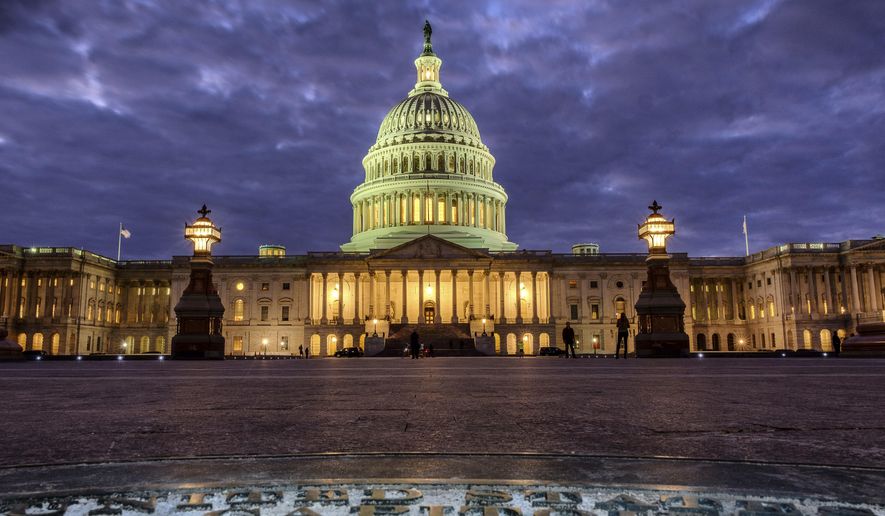As part of February’s deal to end the government shutdown, Congress promised itself it would study the budget process to figure out why it’s so bad at simple things like passing spending bills on time and keeping the government open.
That study has now begun.
“I walk in here hopeful and optimistic, and yet at the same time, cynical,” said Sen. David Perdue, who is one of the GOP’s members on the bipartisan select committee tasked with delivering recommendations by December.
Most lawmakers say they know the problems. Political posturing, aversion to tough votes and perennial fights over the size of scope of government all make it easier for Congress to put off spending battles as long as possible.
Coming up with solutions that don’t give one party an advantage over the other is tougher.
One idea that’s gained steam in recent years is to move from an annual process, under which Congress is supposed to pass a budget and 12 spending bills each year, to a two-year system timed to avoid election-year scraps.
Mr. Perdue said he’d support that, and would also back a delay in the start of the fiscal year from Oct. 1 to Jan. 1, potentially giving Congress three more months to do its work.
The last big budget process overhaul, in 1974, did something similar, moving the fiscal year start from July 1 to Oct. 1, with lawmakers vowing the extra time would solve impasses. It didn’t.
That’s why Mr. Perdue says a penalty, such as a fundraising moratorium for lawmakers or withholding pay until they finish their work, could be needed.
“Simply keep people here until you get it done — weekend, breaks, whatever,” he said.
Since the 1974 overhaul, Congress has finished its budget and appropriations work on time only four times. It’s had to pass nearly 200 short-term spending bills, and survived nearly two dozen government shutdowns since then.
Some Republicans say the problem is Congress has put so much of its budget on automatic pilot, sending debt soaring.
Rep. Jodey Arrington of Texas, one of four Republican House members on the panel, suggested moving some entitlement programs to the discretionary side of the ledger.
“I’m encouraged, as a new member, to be a part of reforming the process,” he recently said on C-SPAN. “Ultimately, if we’re going to get at the debt side of this … it’s going to take the will of the Congress.”
Those ideas aren’t likely to go far with Democrats, who control half the committee’s 16 members and whose support will be needed for any final recommendations. It’s not clear they and the GOP are on the same page.
“Everybody says the process is broken. I’m not sure anybody really knows what that means,” said Rep. John Yarmuth, Kentucky Democrat.
“I’m not sure that the problems are more structural than they are political and personal,” he said.
A major obstacle to serious bipartisan change is that the 60-vote filibuster threshold in the Senate gives the minority party a significant amount of leverage anytime a must-pass deadline approaches amid the threat of a government shutdown.
Both parties discovered that they had more leverage as the junior partner in Congress if they had the threat of a government shutdown looming, figuring it would be embarrassing for the party in power.
Congress had gone six years without passing a full budget before doing so in 2015, when the GOP retook unified control of the Capitol.
They passed budgets for both 2017 and 2018 last year, but those were done to pave the way for passing an Obamacare repeal and the $1.5 trillion tax cut deal on majority votes through what’s known as the “budget reconciliation” process. Neither budget became the basis for governing annual discretionary spending.
“If you haven’t set up a process in which there is any reward for bipartisanship, and the only meaningful prize that can be taken from the whole enterprise is a partisan reconciliation bill to jam something through under the 60-vote threshold, it’s the only prize in the game,” said Sen. Sheldon Whitehouse, Rhode Island Democrat.
“So you’re either not going to play the game at all or that’s the prize you’re going to go for,” he said at a recent event hosted by the Committee for a Responsible Federal Budget.
In addition to creating the budget and appropriations select committee, the recent two-year budget deal also created a select panel to address solvency issues surrounding multi-employer pension plans, as well as the federal agency that insures certain private plans.
Rep. David Schweikert, Arizona Republican and a member of the pension committee, said he hopes members are willing to deal in facts and not retreat to their typical political corners, saying their reforms could serve as a template for how to deal with other struggling pension funds.
“For those who either want a quick bailout or a bonding mechanism that just sort of moves the debt off their books and puts the debt somewhere else — none of those actually solve the problem and in many ways they make the future problems even worse,” he said.
• David Sherfinski can be reached at dsherfinski@washingtontimes.com.




Please read our comment policy before commenting.